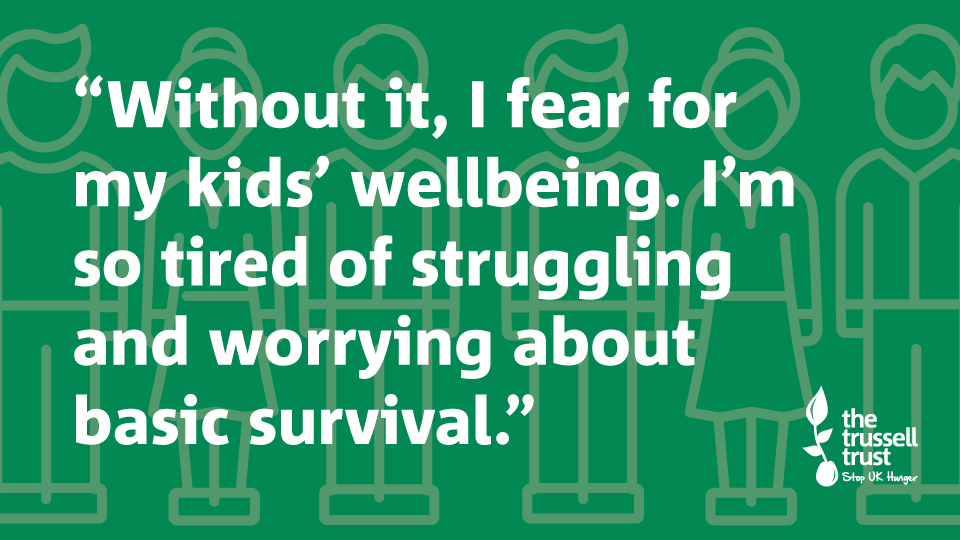By Rory Weal, Policy and Public Affairs Manager
Removing the uplift to Universal Credit will put millions at risk of hunger – the UK Government must do the right thing.
We are coming through one of the most testing winters in our modern history. With the vaccine roll-out developing at a pace, and the days getting longer, there are reasons to muster optimism. But one look at the jobless figures will bring anyone firmly down to earth.
Six million people are currently claiming Universal Credit. As the furlough scheme winds down from the Spring, that number is set to rise even further. The Office for Budget Responsibility does not expect unemployment to fall to pre-crisis levels until 2024. At the same time, need for food banks has hit record levels and shows few signs of waning.
It is in this context that the government is currently making a decision that will affect the lives of the millions who have struggled the most in our dark winter – whether or not to push ahead with a £20 cut in the Universal Credit standard allowance this spring.
It is a sad fact – all too familiar to anyone who has been near a food bank – that our benefits system for too long has simply not given people enough money to afford the essentials in life. This reality was rightly recognised by the government last spring, when they acted decisively to uplift Universal Credit by £20 a week. That doesn’t sound like much, but when you’re on the breadline it is a life saver. We know that it has been the difference between many people needing to turn to a food bank and staying afloat.
But this lifeline is at risk. Unless action is taken, the uplift is set to be whipped away in April, at the same time as support from furlough will wind down. The results could be little short of devastating.
In our survey of people currently receiving Universal Credit, the consequences of this political choice come through starkly. As many as 20% of people claiming Universal Credit, representing 1.2 million people, say that they are ‘very likely’ to need to use a food bank if the £20 uplift is removed. Many more fear they will go hungry. Four in ten (41%) say they are ‘very likely’ to have to cut back on food for themselves, representing over 2.4 million people. These numbers make any cut – at a time of already record hardship – unconscionable.
Children will suffer too. We know that parents would do almost anything before cutting back on food for their children, yet a quarter of a million families fear this will be the result if the uplift is ended. The evidence is clear – going ahead with the reduction would represent a betrayal of the Prime Minister’s welcome commitment that ‘no child will go hungry as a result of any government inattention’.
There has been important recognition in recent weeks of this looming cliff edge, and other short-term policy fixes have been mooted. But these do not address the fundamental problem – before the crisis, following years of cuts and freezes, working age benefits simply did not give people enough money to afford the essentials. This was a significant factor in why we saw food bank use rise year-on-year before the pandemic. We cannot return to that, not least in a period when unemployment will be at record levels and the challenges of finding work much greater as a result. This is an important moment to invest in the government’s flagship Universal Credit system, and help make it the poverty fighting machine we know it can be.
There is a clear economic case for keeping the lifeline too. As our research shows, families don’t have enough financial resilience to save their extra £20 – they have to spend it in the real economy. It is not just food they will cut back on if it goes, but clothing, heating and other vital essentials. Given this money disproportionately goes to the poorest communities in the UK, this would remove a significant amount of demand from fragile local economies at the very time when spending is desperately needed to propel growth. As a result, not only will whipping it away deprive these families of the essentials, it will undermine economic recovery and the ‘levelling up’ agenda in our poorest communities.
At the budget in just a few weeks’ time, Rishi Sunak has a choice to make. Do we give people the dignity and means to afford essentials, taking a vital step towards a hunger free future, or do we accept widespread modern-day destitution and ever rising need for food banks? The evidence is in, the uplift has been a lifeline. It must be kept.



